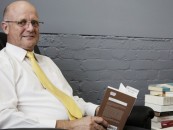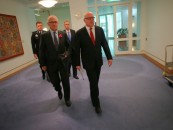Did you cop a speeding ticket these holidays? Many did. Speed limits have the status of holy writ, with everyone expected to obey them. Officially, fines are atonement for sinning.
We are repeatedly told how many people were killed in road accidents over the holiday season, invariably attributed to excess speed. There are gory advertisements warning of lifelong injuries, with big brother enforcement via fixed and hidden cameras, double demerits, average speed cameras, aerial monitoring and highway patrols.
The underlying message never varies – below the speed limit is safe, above the limit is not.
The public thinks otherwise. In the absence of visible enforcement or perceived hazards, voluntary compliance with speed limits is low. A 2009 survey found less than 20% of drivers admit to always driving at or under the speed limit. Another found only 41% thought speeding by up to 10 km/h in a 100 km/h zone was unacceptable, while 38% admitted to speeding by 10-19 km/h and 21% by 20 km/h or more.
Outside narrow suburban streets, exceeding the speed limit is not seen as a problem.
The National Road Safety Strategy seeks to change that. Its aim is to “reduce poor road user behaviour” through “behavioural change”, and has a vision that “no person should be killed or seriously injured on Australia’s roads.”
It asserts we need lower speed limits, additional enforcement including in-car speed monitoring, plus increased penalties.
There is a link between speed and the risk of accidents and injuries. The degree of correlation is disputed and there is some evidence that modestly higher speed limits would reduce the accident rate, but higher speeds certainly lead to more serious accidents and ultimately more of them.
The question is, why not drastically lower speed limits? Given the aim of zero deaths and injuries, why not reduce the speed limit to something like 20 km/h so that accidents are either eliminated or only have minor consequences?
The answer, fairly obviously, is that it would be unacceptable to the community. There is an implicit assumption in speed limits that there will be a certain level of deaths and serious injuries as the price paid for convenient travel. The vision of the National Road Safety Strategy is not only unobtainable, but irrational.
That raises an interesting question. When the law says one thing and most people have a different view, which should prevail? And perhaps more to the point, who should set the speed limits?
The people who currently set them are anonymous, unaccountable bureaucrats. Perhaps the most powerful people in Australia, they essentially decide how many people should die on our roads. Governments and ministers come and go, but they and their speed limits are always there.
This is massive bureaucratic overreach. It is the public, not bureaucrats, who ought to determine the trade-off between travel convenience and the road toll. There is even an internationally recognised method of achieving this, known as the 85th percentile formula. Briefly, it involves the temporary removal of speed limits while speeds are monitored. At the conclusion of the period a limit is reimposed at or slightly above the speed at which 85 per cent of drivers travel.
The method is based on the assumption that the large majority of drivers are reasonable and prudent, do not want to crash, and wish to reach their destination in the shortest possible time.
Evidence shows that those who drive above or substantially below speed limits based on the 85th percentile are far more likely to cause accidents. Enforcement directed at those drivers thus has a positive impact on road safety while enjoying a high level of driver support.
If the public becomes concerned about any increase in road deaths or injuries, this can be expressed through periodic retesting of the 85th percentile.
If the government serves the people rather than vice versa, speed limits should have the approval of most drivers. Instead of being treated like sinful children and a source of revenue, motorists should be the ones who decide what the limits are.
David Leyonhjelm is the Liberal Democrats’ Senator-elect for NSW.








